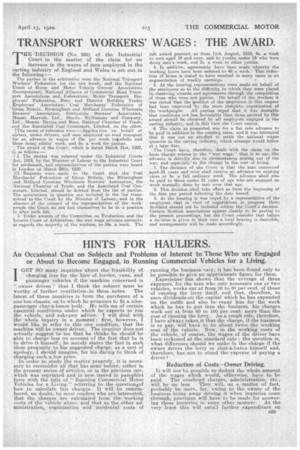TRANSPORT WORKERS' WAGES: THE AWARD.
Page 21

If you've noticed an error in this article please click here to report it so we can fix it.
THE :DECISION (No. 225) of the Industrial
• Court in the matter of the claim for an increase in the wages of men employed in the carting industry of England and Wales is set out in the following:— .
The partieS in the arbitration were the National Transport Workers' Federation (en the one hand), and the National Union of Horse and Motor Vehicle Owners' Associations (Incorporated), National' Alliance of Conimercial Road Transport Associations and. Federations, Motor Transport Employers' Federation, -Bury and District Building Trades , Employers' Association,Coal Merchants' Federation -of 'Great, Britain, Birmingham and Midland Counties Wholesale, Brewers' Association, Derbyshire Brewers' Association, Messrs. Harrods, Ltd., Mes...rs, McNamara and Company, Ltd., Messrs. Davies and Rees, National Chamber of Trade, and the Associated Coal Consumers, Limited, an the other. !'ql.i.e terms of reference were :—Aplilica tion on behalf , of carters, motor drivers, and men employed on road transport for an advance in wages of 10s. per week topskilts and those doing adults' work, and Sc. a week for juniors.
The award of the Court, which is dated March 31st, 1920, is as follows ;—
.',. 1. The matter was referred under theIndustrial Courts Act, 1919, by the Minister of Labour to the Industrial Court for settlement, and representatives of the parties were heard
in London on March 26th, 1920. ' • 2: Requests were made to the Court that the Coal Merchants' Federation of Great Britain, the Birmingham and Midland Counties Wholesale Brewers' Association, the :National Chamber of Trade, and the Asiociated. Coal 'Concomers, Limited, should be deleted from the list of parties. The associations in question are included in the list transmitted' to the Court by the Minister of Labour, and in the absence of the consent of the representatives of the workpeople the Court do not feel, themselves' to be in a position to alter such list.
3. Under awards of the Committee on Production and the Interim Court of Arbitration, the war wage advance amounts, as regards the majority of the workers, to 34s. a week. The ,
11.10 award granted, as from 11th August, 1919, 4s. a. week to men aged la and over, and to youths under 18 who were doing men's work, and 2s. a week to other youths.
4. In addition, agreements have been made whereby the working hours have been reduced to 48 a week. This reduction of hours Is stated to have resulted in many cases in an augmentation of weekly earnings.
5. At the hearing representations were made oii behalf of the employers as to the difficulty, in which they were placed in. observing awards and agreementsthrough the competition of those who were not parties. On behalf of the workers it 'was stated that the-position of the emplayers in this respect had been improved "by the more Complete organization of
the 'workpeople. All parties urged that it was desirable that conditions net less favourable than those secured by this award should be observed by all employers engaged in the carting industry, and in this view the Court concur.
6. The claim as presented was for a flat rate advance to be paid in addition to the existing rates, and it was intimated that it was not an atteilipt to settle the national wages question in the carting industry, which attempt would follow at a later date.
The Court have, therefore, dealt with the claim on the basis thatiit relates to the "war wage," that is to say, the advance is directly due to circumstances arising out of the war, and especially`to the change in the cost of living.
7. The decision of the Court is that the men concerned aged,21 years and over shall receive an advance on existing rates of Sc. a fall ordinary week. The advance shall also be paid to those under 21 years of age who are engaged on work normally done by men over that age.
8. This decision shall take effect as from the beginning of the brat pay period following the date hereof, 9. At the hearing it was nrged.by a representative of the employers that in' vieW of negotiations in progress there Seotlaaid should not be included within the Court's decision. Certain Scottish associations appear clearly to be parties to tbe present proceedings, but the Court consider that before a decision is given in their case a local hearing is desirable, and arrangements will be made accordingly.


























